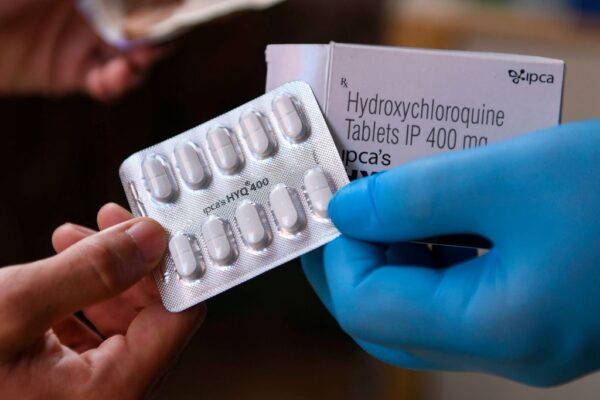
Results of new clinical trial published late last week have found that hydroxychloroquine – the malaria and autoimmune disease drug that President Donald Trump promoted as a potential “game changer” early in the Covid-19 pandemic – not only failed to improve outcomes in those with mild-to-moderate disease, but also produced a higher rate of cardiac and liver side effects.
Results of the randomized, controlled, open-label Phase III trial, which took place at more than two dozen sites in Brazil, were published in the New England Journal of Medicine on Thursday. The study randomized 667 patients to receive hydroxychloroquine or the drug plus the antibiotic azithromycin on top of standard of care or standard of care alone. When patients were measured on the seven-point ordinal scale of improvement in disease, those in the two hydroxychloroquine groups showed no improvement compared with patients who received standard of care alone. Moreover, those receiving hydroxychloroquine more frequently experienced Qt prolongation and elevation of liver enzymes.

With the Rise of AI, What IP Disputes in Healthcare Are Likely to Emerge?
Munck Wilson Mandala Partner Greg Howison shared his perspective on some of the legal ramifications around AI, IP, connected devices and the data they generate, in response to emailed questions.
“Among patients hospitalized with mild-to-moderate Covid-19, the use of hydroxychloroquine, alone or with azithromycin, did not improve clinical status in 15 days as compared with standard care,” the authors wrote.
The results add to the growing body of evidence not supporting treatment of Covid-19 with hydroxychloroquine, an analogue of chloroquine, which has also been explored without success in Covid-19. Last month, the Food and Drug Administration revoked an emergency use authorization that it had granted to the drug in late March, a move that had been criticized as motivated more by politics than by science.
The drug nevertheless saw a briefly renewed lease on life earlier this month when researchers at the Henry Ford Health System in Detroit published a retrospective analysis of 2,541 hospitalized Covid-19 patients in the International Journal of Infectious Diseases showing that 13% of those treated with the drug died, compared with 26.4% of those who did not receive it. However, while several right-wing media figures celebrated the data, a review in the same journal pointed to numerous confounding factors that called the purported benefit into question.
And two weeks ago, a post-publication peer review in the International Journal of Antimicrobial Agents strongly criticized the original paper that spurred interest in the drug, published earlier this year, pointing to numerous methodological flaws rendering it “nearly if not completely uninformative” and denouncing it as “fully irresponsible.”
Photo: Narinder Nanu, AFP, via Getty Images














